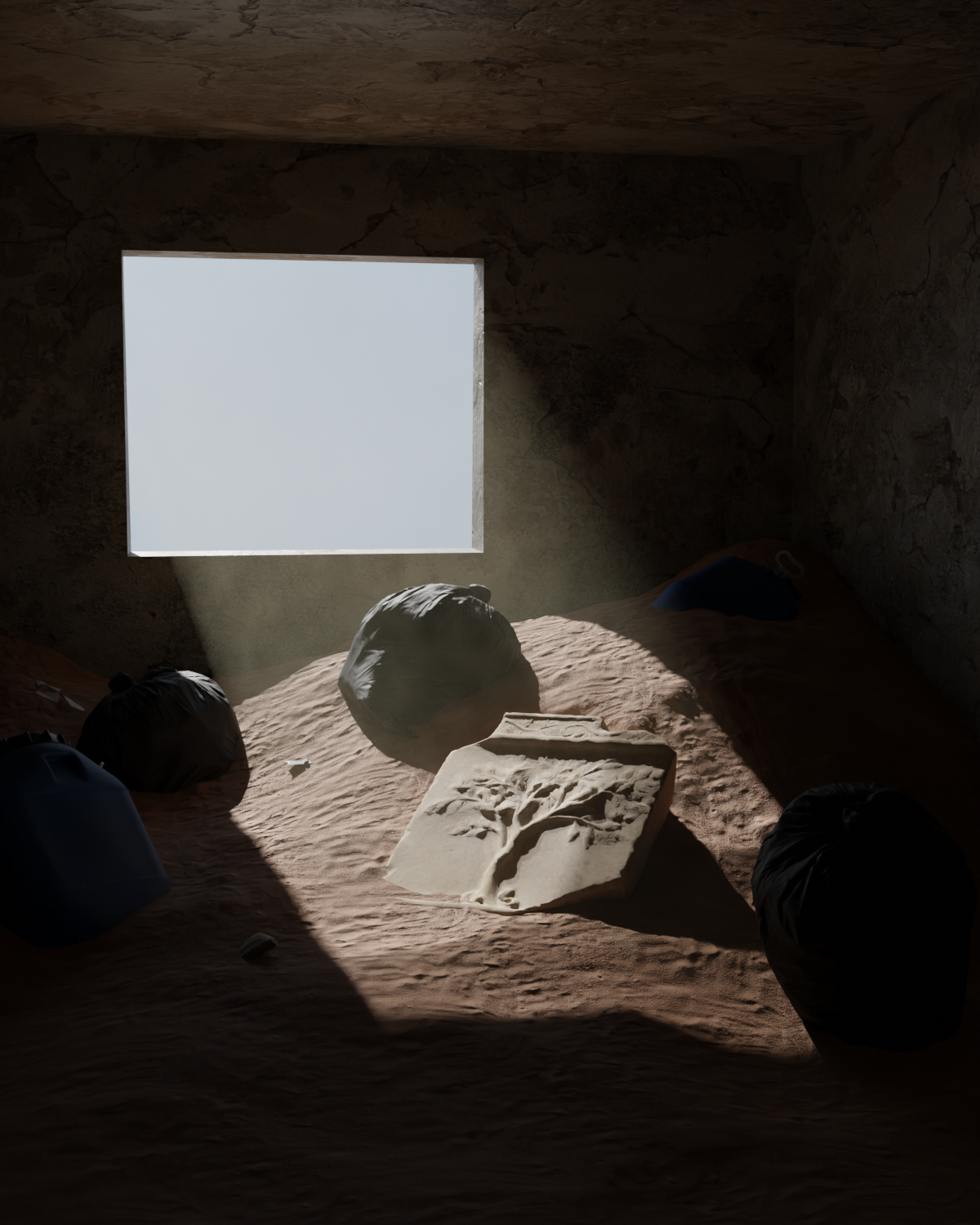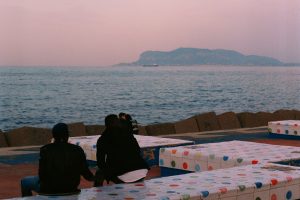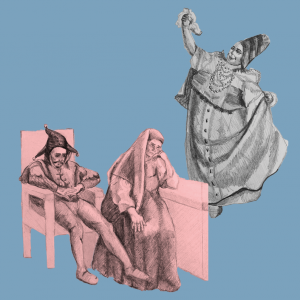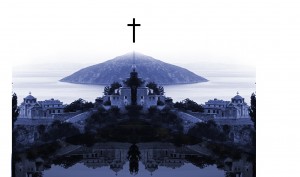Princess Vira’s Palace
by Zaid Magdub | August 22, 2024

It is often said that there is a مصر (Masr) and there is an Egypt, the same place but not. Of the Mediterranean, the same is true. There is a Mediterranean of pale Greek islands, of chateaus on Roman rivieras and LSD by Spanish vineyards, one of parties on the corniche, and olive groves by Turkish holiday resorts. And then there is another Mediterranean, one where you actually live in the rustic villages you romanticise, of shantytowns, of boredom and alienation. The Mediterranean of overflowing sewage by the Nile, and waste as thick as vegetation in Beirut. A Mediterranean of trash, of Knasa as it is called in my own Libyan dialect. I have spent far more summers in the latter than the former.
On a midsummer afternoon in my hometown Sabratha, on the Mediterranean coast, I embarked on a trip to a set of ruins, once known as the palace of ‘Princess Vira.’ A former colonial estate that overlooks Tileel, a beach in Sabratha of sapphire blue sea and virgin white sands, its ruins reveal the shattered visage of bygone era. Only it, and a now desecrated church and mayoral office, survive as remnants of a colonial past. The story was recounted over a large dish of couscousi by my great aunt—a lady witness to this past who never hesitated to grace us with her stories, recalling boozy Italian settlers urinating in the wine they stomped on. She told of a palace dedicated to Princess Vira, a countess of some sort who had spent years and years awaiting its construction, yet passed before she could witness the completion of her magnum opus.
I am yet to find any proof of who this Princess Vira was, but her story seems oddly metaphorical; the story of her palace is a tale reflective of Italian exploits in Libya. In the 1930s, there came a need to satisfy Italy’s ‘Peasant Question’, as the rising militancy among the masses came to threaten the Italian ruling class, a fragile and bumbling alliance of feudal landlords, to which Princess Vira must have belonged. Libya became the land onto which their class anxieties were projected. Rather than submit to the demands of the lower classes, the aristocracy imported them to Libya, where they became subjugating landowners to a new people. Just like Princess Vira, they dedicated considerable resources to fulfill their purpose: a purpose of brutal massacres, disenfranchisement, and deportation—genocide. The beauty built on the bloodied backs of my grandfathers can still be seen in central Tripoli, or once upon a time in the melting marble of Princess Vira’s palace. But just like Princess Vira, their efforts came to naught. Just as Graziani declared Libya ‘pacified,’ World War Two began, and Libya was lost as a colony before the settlers could fully reap the blood that they had spilled. They never got to live in the palace they built.
The building itself is dull and unimpressive, a hollow ode to a stunted legacy. Yet it contained a most poetic symbol. I recall standing by a vast window, looking out towards the Mediterranean, my feet submerged in bags of trash. The most potent icon of imperial subjugation left in Sabratha, an eternal herald to oppression, was awash with trash. Sacks of filth filled its hallways, drawings of phalluses etched onto its walls. It was smeared with a scent of faeces from nappies scattered along the corridor. I wanted it to mean something, some great protest, some humiliation of Princess Vira, her legacy defiled in the crudest possible way. I wanted every bit of dirt to be a tessera of indignation in a mosaic of revolt against the colonial past.
But I would be amiss to pretend that this was some great cultural protest. No one is dumping bags of shit to honour the heroes of the Libyan resistance, not for Umar Al-Mukhtar; or even our own Joan of Arc Mubruka Al-Alleqiya, a native of Sabratha. As painful as it is to admit, they throw trash in Vira’s mausoleum as they do onto the fields, or onto the roads. The prognosis that I often hear rings true: Al Sha’ab Mrid (‘The people are sick’), and Al Sha’ab Ta’ban (‘The people are tired’).
From that hallway in the Vira’s palace, one has a most beautiful view of Tileel and the strip of coast belonging to one Ahmed Al-Dabashi, popularly known as ‘Ammou, an endearing nickname meaning ‘uncle’ that he acquired during his days as a lowly vegetable vendor. He then began shipping migrants, condemning them to death by drowning or the purgatory of life as an illegal immigrant in Europe. Soon ‘Ammou was co-opted by the Italian authorities hoping to renegade his industry through lucrative investments. His late proselytism to the cause of anti-smuggling would see him driven out of Sabratha by political groups harmed by his conversion. Upon his return from exile, ‘Ammou diversified his assets, consolidating this strip of coast, the largest family beach resort in the city.
Men like ‘Ammou are seen more often than not as the antagonists of the story of the homeland, their Militias the cause of the trash. In disrespecting the rule of law and plunging the nation into perpetual warfare, they are seen to be responsible for the state’s degeneration. Men like ‘Ammou develop larger than life reputations, becoming Mafiosos in a way that would make Coppola or Scorcese yelp with excitement. But this is to make cinema from the tears of a nation. These Militias do not deserve a mythos, men like ‘Ammou are not just warlords. They are simply another section of the Libyan bourgeois; as much as they warlords, they are factory owners, financiers, real-estate landlords, and even beach-resort owners. In the English home-counties they’d be called Nouveau Riche; in Libya, they’re criminals. The only distinction between them is that they leverage power through the bullets of a Kalinshnikov, not through the red tape of bureaucracy. They are not the source of the trash, but they are the parasites enriched from it.
Besides the beach and the Ozymandian ancient city for which it is famed, there is not much to see in Sabratha. Even the ruins of Antiquity have been looted by profiteers. The Amphitheatre—the largest and most spectacular of Roman Africa—is tattooed with bullet holes from the wars fought by ‘Ammou. Sabratha and its trash reflects the provincial monotony of Libya, a horizon of poor infrastructure, decaying spaces and mismatched urban sprawl, all tightly hugging the only highway the nation has.
This is the Mediterranean of Knasa, of trash. Urban spaces have long rotted away. The main highway that services an entire nation was built in 1967 and has barely expanded since. The theaters and railways have long disappeared since Gaddafi’s programme of ‘Bedouinisation’, an attempt to develop Libya in the reified image of its semi-nomadic past that has instead curtailed civil society, cinema and infrastructure. Mosques have become hot beds of Salafi evangelism where even traditional practices and attire are now mocked as heretical innovations. Tourism is non-existent, and the economy is stagnant, dependent on oil; youth unemployment is terminal even amongst those who have pursued education. Worst of all is the boredom, Ksad. It is a boredom that alienates: there is nothing to do, the city is not worth living in, and the future is always uncertain. They are sick and they are tired. Al Sha’ab Mrid. Al Sha’ab Ta’ban.
Leaving Sabratha, I recall once seeing a field quite literally fade into an endless horizon of rubbish bags. My immediate instinct was to look down in snobbery—I now believe I would dump my trash there too.
Everyone goes back to the beach to escape. These days people don’t just go to swim. There are a growing number of Libyan Haraga, migrants who cross the sea to Europe, martyrs who transcend the divide between the two Mediterraneans; the ones that escape; the ones that abandon the mess of the homeland for their poisoned chalice across the sea. Some mourn them, like my great aunt. In a fashionably macabre speech, she explained that she no longer eats fish because she had seen drowned migrants on the television and assumed that the fish must have eaten them. But for others, they are envied, particularly by the young and disillusioned—they would rather drown in a sea of salt, than a sea of trash.
When visiting the beach, I always make sure to swim far enough that the coast can barely be seen. There I lay on my back, blissfully unaware of the jellyfish that may surround me. Sometimes I imagine myself off the coast of Malta; or I imagine myself on a Tellil of a different Libya, with beach-clubs and bars, scantily-clad party-goers that would outrage my father, and music until the first flutters of dawn. I imagine myself in the other Mediterranean. It is a baseless escapism, but an escapism you need when you’ve been standing in the trash of Princess Vira’s palace.
∎
Words by Zaid Magdub. Art by Nikhil Karun.




